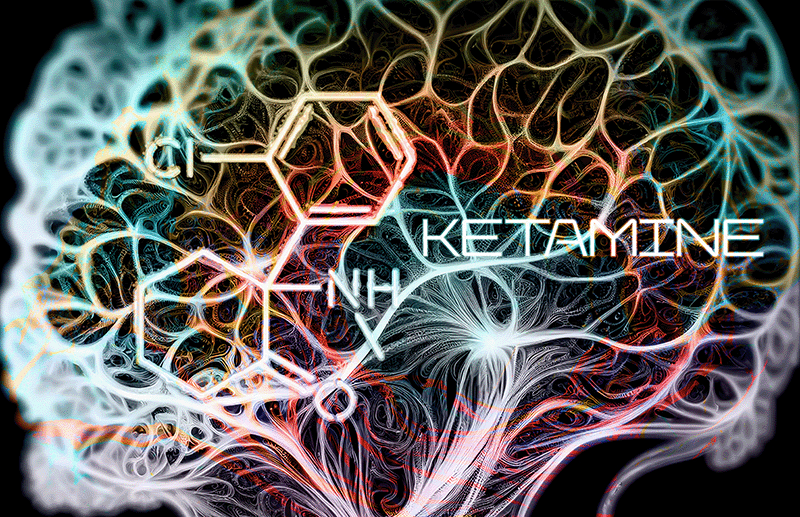Ketamine Assisted Psychotherapy
KAP, a paradigm shift in mental health therapy, represents an amalgamation of pharmacological advancements and psychological interventions, offering a ray of hope for those grappling with debilitating mental health disorders. It fuses the potent effects of ketamine, a dissociative anesthetic, with the transformational potential of psychotherapy, creating a therapeutic synergy that reaches deep within the human psyche to facilitate healing and wellness.
A Revolutionary Approach to Mental Health
In today’s rapidly changing world, mental health disorders are an escalating global concern. The World Health Organization estimates that one in four people in the world will be affected by mental or neurological disorders at some point in their lives. With such daunting statistics, the pursuit of effective treatments is not just desirable, but it’s also an urgent necessity. Modern mental health care has seen the advent of a revolutionary treatment modality that combines the power of a well-known anesthetic with contemporary psychotherapy techniques. This is the world of Ketamine-Assisted Psychotherapy, widely recognized as KAP.
Driving this revolutionary approach is Kathryn A. Walker, the industry-renowned founder of Revitalist. With her deep understanding of the intricacies of the human mind and her proficiency in pharmacological therapeutics, she has spearheaded the application of this pioneering treatment modality. She dedicates her clinical practice to unlocking the potential of this unique therapeutic combination, embodying the principle of integrative mental health care that acknowledges and addresses the complex interplay between biological, psychological, and social factors influencing mental health.
This article invites you on a journey into the world of KAP. It will unravel the conceptual foundations of this groundbreaking therapy, demystify its process, and spotlight the transformative benefits it brings to those battling various mental health disorders. It will also cast a gaze into the future, speculating the role this innovative therapy might play in shaping the trajectory of mental health care.
In a landscape that often seems dominated by treatment-resistant cases and a lack of truly effective therapies, KAP shines as a beacon of hope. The integration of ketamine’s rapid and potent effects with the depth and insight provided by psychotherapy leads to a treatment experience that is not just about symptom management, but about fundamentally reshaping one’s relationship with their inner world. This innovative approach to mental health care opens new doors of perception, understanding, and healing. Join us as we delve deeper into the world of Ketamine Assisted Psychotherapy.
What is Ketamine-Assisted Psychotherapy (KAP)?
Ketamine-Assisted Psychotherapy, or KAP, represents a pioneering therapeutic approach that synergistically combines the potent effects of ketamine, a powerful dissociative anesthetic, with the transformative potential of psychotherapy. This hybrid methodology borrows from the principles of pharmacology and psychology to present a unique treatment paradigm for mental health disorders.
Ketamine, first synthesized in the 1960s, has been traditionally employed in anesthesia for its potent dissociative properties. However, in more recent times, the drug’s potential in mental health treatment has emerged due to its profound effects on mood and perception. The psychedelic effects induced by ketamine administration create a state of heightened perceptual sensitivity, a sense of disconnection from the self, and an open receptiveness to change. This altered state of consciousness often paves the way for introspection and insight, forming a fertile ground for therapeutic intervention.
Psychotherapy, a well-established tool in mental health treatment, forms the second integral part of KAP. It involves a range of techniques intended to improve mental health, reduce distressing symptoms, and promote overall wellness. By encouraging exploration of feelings, thoughts, and behaviors, psychotherapy fosters self-awareness, understanding, and positive change.
In KAP, these two components are utilized in synchrony. The psychedelic effects of ketamine are harnessed to potentiate the efficacy of psychotherapy, facilitating a deeper and more profound therapeutic process. This fusion helps to transcend the constraints of traditional therapies, creating transformative experiences that encourage healing and personal growth.
A key figure in this innovative arena is Kathryn A. Walker. She has been instrumental in refining the protocols for KAP, optimizing the balance between ketamine administration and psychotherapy to maximize therapeutic outcomes. Every aspect of the treatment protocol is meticulously designed and individualized to meet the specific needs of each patient, based on their unique psychological landscape.
Walker’s work centers on creating a safe and supportive environment for the administration of KAP. Safety and comfort are paramount, with protocols ensuring careful monitoring and supervision throughout the treatment process. The emphasis is not solely on symptom reduction; her holistic approach is geared towards promoting long-term resilience, enhancing psychological wellbeing, and facilitating personal transformation.
Moreover, Kathryn A. Walker’s pioneering work in KAP signifies an important paradigm shift in mental health care. Her emphasis on combining pharmacological interventions with psychotherapeutic techniques offers a more comprehensive treatment approach. This holistic perspective not only addresses the biological and psychological dimensions of mental health but also fosters resilience and personal growth, key components of overall wellbeing.
In the grand scheme of mental health treatments, KAP stands as an innovative and promising approach that integrates the most effective components of pharmacology and psychotherapy. With leaders like Kathryn A. Walker at the helm, the future of KAP appears bright and filled with potential.
Journey Through a Ketamine-Assisted Psychotherapy (KAP) Session
Embarking on a journey with Ketamine-Assisted Psychotherapy (KAP) at Revitalist, guided by the expertise of Kathryn A. Walker and her skilled team, represents a transformative experience. This journey, although individual in its specifics, typically follows a meticulously designed process to ensure maximum therapeutic benefit. Here, we delve into the fundamental stages of a KAP session, demystifying its structure and elucidating the therapeutic intention embedded within each stage.
Preparation: Establishing the Foundation
Prior to the administration of ketamine, the journey begins with critical preparatory sessions. These initial encounters between the patient and the therapist are aimed at establishing rapport and creating a therapeutic alliance, which forms the bedrock for the work that lies ahead. During these sessions, the therapist familiarizes the patient with the process of KAP, setting clear expectations and allaying any concerns or apprehensions.
An essential component of these preparatory sessions is the articulation of intentions for the therapy. Setting a clear therapeutic intention, often centered around personal growth, healing, or insight, provides a focus and direction for the journey. These intentions, although not rigidly binding, serve as guiding beacons, assisting in navigating the psychedelic experience.
Ketamine Administration: The Therapeutic Catalyst
The next stage of the journey involves the administration of ketamine. A sub-anesthetic dose of this potent dissociative anesthetic is administered, typically via intravenous infusion or intramuscular injection. Importantly, both the dose and the route of administration are customized, tailored to align with the patient’s health status, therapeutic needs, and comfort level.
Under the watchful eye of Kathryn A. Walker and her team, safety and patient comfort are prioritized throughout the process. The administration environment is thoughtfully curated to evoke a sense of calm and reassurance, promoting a positive experience.
Psychotherapy During Ketamine Effects: Diving Deep
Once the ketamine takes effect, patients typically enter a state of altered consciousness, characterized by a heightened sensitivity and openness to psychological interventions. This altered state often paves the way for a deeper exploration of the psyche, unveiling insights and promoting catharsis.
In this phase, the therapist actively engages with the patient, employing a range of therapeutic techniques to explore and address deep-seated emotional issues, core beliefs, and past traumas. The work done in this period forms the crux of the KAP process, harnessing the unique effects of ketamine to potentiate the therapeutic impact.
Integration Sessions: Making Meaning and Moving Forward
Following the ketamine session, the journey doesn’t abruptly end. The insights gained and the emotional shifts experienced during the ketamine session need time and space to be processed, understood, and integrated into one’s conscious understanding. This is where integration sessions come into play.
Integration sessions are structured spaces where patients reflect on their experiences, make sense of the insights gained, and deliberate on how to integrate these revelations into their daily lives. These discussions often revolve around leveraging the therapeutic changes initiated during the KAP session and integrating them into one’s worldview, fostering an enduring transformation that transcends the confines of the therapy room.
In the grand scheme of the KAP journey, each stage plays a vital role, collectively contributing to a transformational process that fosters healing, growth, and self-understanding. Through her work at Revitalist, Kathryn A. Walker, with her astute understanding of this intricate process, provides a secure and nurturing space for patients to embark on this transformative journey, reinforcing the potential of KAP as a significant instrument of change in mental health care.
The Power of Ketamine-Assisted Psychotherapy (KAP): An Insight into Its Therapeutic Benefits: In the landscape of mental health, Ketamine-Assisted Psychotherapy (KAP) has emerged as a beacon of hope, demonstrating an impressive range of therapeutic benefits. Its unique approach that combines the potent effects of ketamine with the insight-oriented process of psychotherapy is not only revolutionary but also highly effective in addressing an array of mental health disorders. Under the meticulous and empathetic guidance of Kathryn A. Walker at Revitalist, these benefits have been harnessed to create transformative experiences for individuals struggling with various mental health conditions.
An Effective Intervention for Treatment-Resistant Depression
In the realm of depressive disorders, one of the most challenging situations clinicians encounter is treatment-resistant depression. These are cases where individuals, despite trying various antidepressants and psychotherapies, continue to grapple with debilitating depressive symptoms.
KAP stands out as a beacon of hope in such scenarios, demonstrating exceptional efficacy in treating treatment-resistant depression. The rapid-acting antidepressant effects of ketamine, coupled with the psychotherapeutic process that delves into the root causes of depression, can lead to significant improvements. Patients often report a reduction in depressive symptoms and a renewed sense of hope and zest for life.
A Lifeline for Those with Suicidal Ideation
The rapid antidepressant effect of ketamine has also proven to be a lifeline for individuals struggling with suicidal ideation. Unlike traditional antidepressants, which may take weeks to produce a noticeable effect, ketamine’s impact is often observed within hours. This swift alleviation of distress, combined with the therapeutic insights gained during the KAP session, provides immediate relief and ongoing support to those grappling with such intense emotional pain.
An Ally in Combatting Post-Traumatic Stress Disorder (PTSD)
For individuals battling the invisible scars of trauma manifested as PTSD, KAP can be a significant ally. The unique dissociative effects of ketamine can create a safe psychological space where traumatic memories can be revisited without triggering overwhelming distress. This, in conjunction with the psychotherapeutic process aimed at resolving these traumatic memories, facilitates their reprocessing and resolution, leading to substantial reductions in PTSD symptoms.
Alleviating Anxiety Disorders
Ketamine’s calming effects, when paired with the anxiety-management techniques utilized during therapy, offer a powerful approach to alleviate the symptoms of anxiety disorders. Through KAP, individuals learn to manage their anxiety in healthier ways, often reporting reductions in panic attacks, constant worry, and other anxiety symptoms.
Treating Substance Use Disorders
The arena of substance use disorders is another area where KAP shows immense promise. Substance use often stems from deep-rooted emotional pain, and addressing these underlying issues is key to recovery. KAP assists in this process, offering an opportunity to explore these emotional issues within the safety of the ketamine-induced therapeutic space. Additionally, KAP aids individuals in developing healthier coping strategies, promoting a shift away from substance use as a means of managing emotional distress.
While the transformative power of Ketamine-Assisted Psychotherapy is indeed impressive, what truly brings this therapy to life is the skilled and compassionate approach of professionals like Kathryn A. Walker. Her dedication to patient wellbeing ensures that each KAP session at Revitalist is an individualized, safe, and transformative experience, embodying the potential of KAP to revolutionize mental health care.
The Future of KAP
The field of Ketamine-Assisted Psychotherapy is constantly evolving, and under the expert guidance of Kathryn A. Walker, the potential of this therapeutic method continues to be explored. Current research is focusing on refining protocols for KAP, identifying the conditions that respond best to this approach, and elucidating the mechanisms through which ketamine facilitates psychotherapeutic change.
Ketamine-Assisted Psychotherapy is more than just a treatment; it’s a transformative journey, one that brings together the profound insights of psychotherapy and the potent effects of ketamine to catalyze deep, lasting change. At the heart of this transformative care is Kathryn A. Walker, a pioneer in the field, guiding individuals on their journey to mental wellness with empathy, expertise, and unwavering dedication.
KAP at Revitalist is not merely about symptom alleviation. It’s about fostering resilience, promoting personal growth, and empowering individuals to lead fulfilling lives. As we continue to navigate the mental health landscape of the 21st century, KAP stands as a beacon of hope, an innovative approach that signifies a significant leap forward in the quest for effective mental health treatments.
Whether you’re a patient seeking innovative treatment options, a healthcare provider looking to understand the latest breakthroughs in mental health, or someone intrigued by the evolution of psychotherapy, we invite you to explore the world of Ketamine-Assisted Psychotherapy. Welcome to a future where mental health care transcends conventional boundaries, offering hope and healing through the powerful synergy of ketamine and psychotherapy. Welcome to KAP at Revitalist.
Contact Kathryn
Let Kathryn Help Your Journey To Wellness
Kathryn A. Walker's expertise in the field of ketamine treatments can be a valuable resource on your wellness journey, especially if you're seeking alternative solutions for treatment-resistant mood disorders. Her pioneering research and insights into ketamine's potential can offer hope and guidance, providing you with a deeper understanding of the possibilities for improving your mental health and overall well-being.
News Articles
Wellness Blog
Ketamine has garnered significant attention in wellness blogs due to its emerging potential as a novel treatment for treatment-resistant depression and other mood disorders.
Wellness blogs often explore the latest research and personal experiences with ketamine therapy, providing readers with valuable insights and considerations in their pursuit of mental health and well-being.
The Neurologic Power of Ketamine and Psychedelics: How Science is Overtaking Theory
Introduction In the realm of mental health, the intersection of neuroscience and treatment is a rapidly evolving frontier. As our understanding of the brain deepens, so does our ab
The Need for Disruption of the System – Why Our Mental Health System is Imploding
Introduction In the realm of healthcare, few areas are as critical, yet as overlooked, as mental health. Despite the fact that mental health disorders are among the leading causes
The Empathy of the Brain: How Ketamine and Psychedelics Allow Us to Reconnect with Ourselves
Introduction In the vast and complex world of neuroscience, one of the most intriguing areas of study is the exploration of how certain substances, such as ketamine and psychedelic



